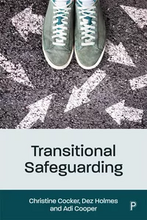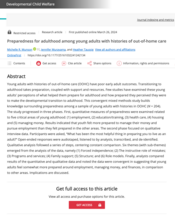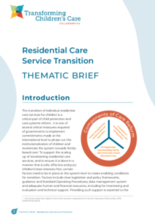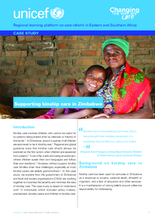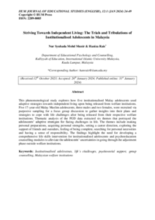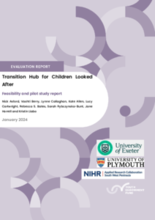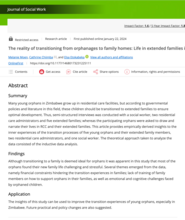Displaying 1 - 10 of 953
In this video, Tamara Mwale of Alliance for Children Everywhere (ACE) Zambia shares a story of reintegration. At ACE, whenever possible, the team seeks to reintegrate children with biological family.
This study investigated social orphans through narratives of young people with experiences of growing up in institutional care in Latvia. The study uses the life histories of participants to explore the phenomenon of social orphans.
This book sets out the case for Transitional Safeguarding, a new approach to protection and safeguarding designed to address the needs and behaviours of young people aged 15-24 who are falling between gaps in current global systems, with often devastating results. While the book addressed the gaps in the current system in the UK, the lessons have global application and the authors outlines how the specific needs of young people can be met through this approach.
This convergent mixed methods study builds knowledge surrounding preparedness among a sample of young adults with histories in out-of-home care in the U.S.
This brief contains high-level guidance and recommendations for policy and decision-makers and development partners to consider in designing frameworks to scale up, coordinate and support the transition of individual residential care services.
In this case study, the authors explore how the government of Zimbabwe and local civil society organisations (CSOs) are working together to maximise the benefits and minimise the risks of kinship care. The case study is based on interviews with 12 individuals which included policy makers, practitioners, kinship carers and children in kinship care.
This report represents a summary of presentations and discussions held throughout the two days of the BICON International Conference on Alternative Care for Children in Asia 2023.
This phenomenological study explores how five institutionalised Malay adolescents used adaptive strategies towards independent living upon being released from welfare institutions. Five 17-year-old Malay Muslim adolescents, three males and two females, were recruited via purposive sampling for a focus group discussion to gather insights into their plans and strategies to cope with life challenges after being released from their respective welfare institutions.
This is a feasibility and pilot evaluation of the Transition Hub -- a multi-disciplinary team which aims to support young people aged 11 to 17 who are making the transition into care or experiencing a placement transition in England. The feasibility phase explored the feasibility of delivery and aimed to provide lessons for further research. The pilot phase examined whether the Transition Hub might evidence promise on desired outcomes and sought to offer further learning about delivery and acceptability.
Many young orphans in Zimbabwe grow up in residential care facilities, but according to governmental policies and literature in this field, these children should be transitioned to extended families to ensure optimal development. This article provides empirically derived insights to the inner experiences of the transition processes of five young orphans and their extended family members, two residential care administrators, and one social worker.


